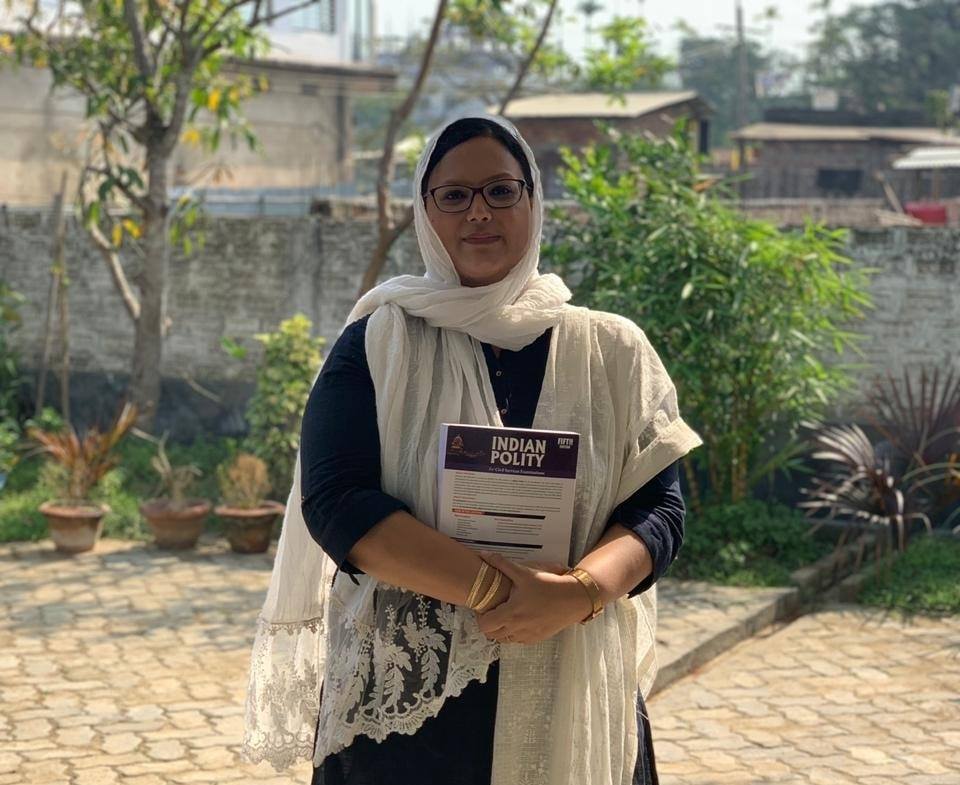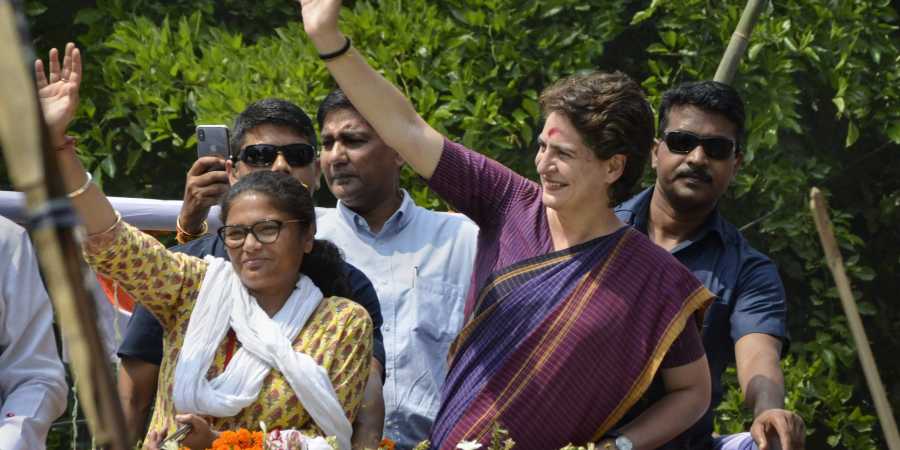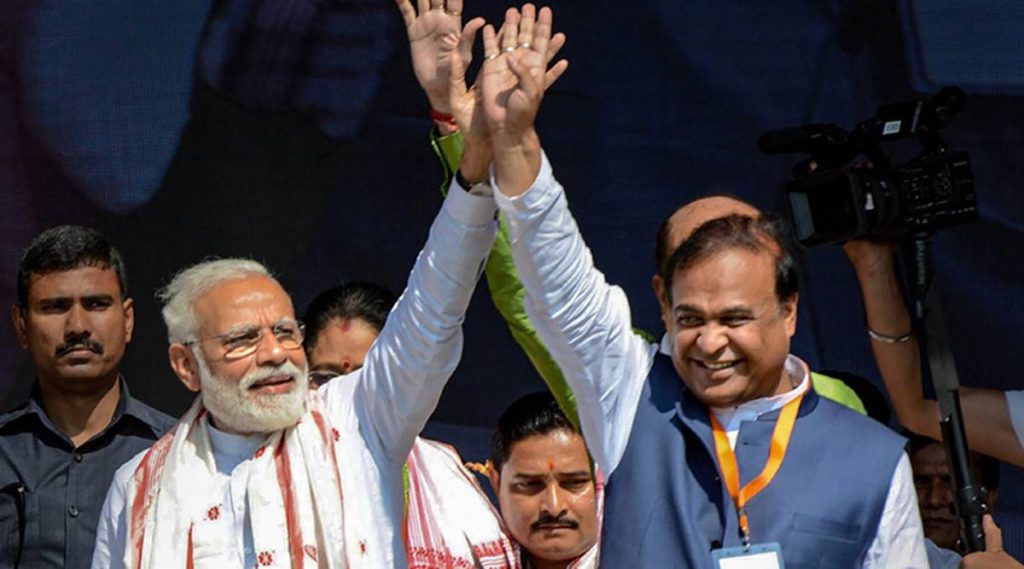
In Assam's Barak valley, Muslim woman candidate gives BJP, Cong the jitters

In Assam’s most hotly contested seat, Silchar, even leading psephologists believe it would take a ‘political miracle’ for a Muslim candidate to win the seat, currently held by Congress’ Sushmita Dev. And Nationalist People’s Party (NPP)’s Nazia Yasmin Mazumdar is hoping to be that miracle.
Silchar in Hindu Bengali-dominated Barak Valley will vote in the second phase on April 18. If poll pundits are to be believed, the two Lok Sabha seats — Silchar and Karimganj — of Barak valley are likely go to the BJP this time.
The importance of the seat could be gauged by the fact that Congress general secretary for Uttar Pradesh (East) Priyanka Gandhi Vadra made her first rally outside the northern state in Silchar on April 14. On April 11, it was Prime Minister Narendra Modi wooing the Barak valley voters at Silchar for BJP candidate Rajdeep Roy. A day after Modi’s visit, the constituency saw Congress star campaigner Navjot Singh Sidhu playing the cheerleader for Sushmita.
But all these big rallies and heavyweights don’t scare Mazumdar.
Who is Nazia?
Nazia Yasmin Mazumdar, an engineer who left her corporate job with Tata Consultancy Services (TCS) to serve Cachar, as she claims, is contesting as the NPP candidate — a party led by Meghalaya Chief Minister Conrad Sangma. Mazumdar’s campaign is high on dreams of a Shonar Cachar (a golden Cachar district, which forms the Silchar Lok Sabha constituency). In all her appeals, she has been seeking support as a true daughter of Cachar, urging voters to judge the “candidates individually and not in name of party, religion or their father” — an apparent dig at Congress’ Sushmita.
Adding heft to her argument, she cites the example of the late Moinul Haque Choudhury, a five-time Silchar MLA and Union minister in Indira Gandhi cabinet. “Moinul Haque Choudhury worked for everybody and the entire region benefitted from the developments he brought to Cachar. I too appeal the voters to think in terms region and not to follow the usual divide and rule policy. If we truly care for the future of our region and our children, we should unite for region, not religion,” she says.
There is a sudden groundswell for Nazia which has sent the BJP and the Congress into a tizzy. Nazia believes although elections are mainly about caste and religious arithmetic in India, it is chemistry with voters that holds the key.
The arithmetic in Silchar
Barak valley comprises the three districts of Cachar, Hailakandi and Karimganj. In Cachar district, Hindus form nearly 60 per cent of the electorate, Muslim more than 35 per cent while the rest is shared among tea garden labourers and Hindi-speaking people.

Silchar Lok Sabha seat has been a Congress pocket borough since Independence. The party has won the seat seven of the 10 times it went to polls. While it was won by Congress heavyweight late Santosh Mohan Dev (Sushmita’s father) five times, BJP veteran Kabindra Purkyastha has won the seat thrice. In the last Lok Sabha elections, it was a tough fight between the Congress and the BJP which saw Sushmita recording a stunning victory defeating BJP veteran Purkayastha by more than 1.2 lakh votes.
However, the valley has largely remained the BJP’s prized possession. Much before it came to power in Assam in the 2016 Assembly elections, the party made inroads for the first time in the state in 1991 with nine of the 10 seats it won in the Barak valley. In the 1996 Lok Sabha elections, it won all four seats in Barak valley. Out of the seven Assembly segments in Silchar parliamentary constituency, the BJP has six seats in its kitty at present.
Strangely, despite a ‘Modi-wave’ sweeping the Brahmaputra Valley in 2014, it didn’t have much impact on Barak Valley. While the Congress wrested the Silchar seat from BJP in 2014, Karimganj seat was won by the AIUDF. (Ironically, the Congress at that time swayed the Bengali Hindu voters by promising citizenship. In 2013, then Assam Chief Minister Tarun Gogoi had said that he would seek refugee status for people who migrated to India from Bangladesh following persecutions. “This will mean a central law for those who were forced to leave their homes. It will be on the lines of political asylum,” Gogoi had promised.)

But this elections, it is the BJP which is hugely betting on the citizenship bill — the biggest issue in Barak Valley — to turn the tables on the Congress here.
Citizenship Bill and Barak valley
Silchar, a commercial hub, is also a point of origin for supply of essential commodities to neighbouring states of Mizoram, Tripura and Manipur, which witnessed major protests against the Citizenship Amendment Bill early this year. While the bill met strong opposition across the Northeast, it received massive support in Hindu Bengali-dominated Cachar and Karimganj districts.
This is a reason why Sushmita’s stand on the Citizenship Bill is different from that of her party’s. In January this year, Sushmita went against her party line and supported the bill. A member of the joint parliamentary committee on the bill, she had written a note supporting “unconditional citizenship” for “all persons of Indian origin who entered the Indian territory up to December 31, 2014.” “There is no denying that people of Barak Valley support the Citizenship Amendment Bill. And as their representative, I am inclined to consider their views,” she had said at the time.
The BJP’s proposed amendment seeks to grant nationality to non-Muslims from Bangladesh, Afghanistan and Pakistan only after six years of residence in India.
When the final draft of the National Register of Citizens was published last year, more than 40 lakh people didn’t find their names in the list. Although there was no official district-wise break-up of the numbers, it is believed most of these people belong to Barak Valley’s Hindu Bengali community — a reason why they are counting on the citizenship bill to save them from being declared non-citizens. So, the Congress opposing the Citizenship bill this time elsewhere has not gone down well with the Bengali refugee population.
Where does Congress stand
The grand old party is hoping to repeat its 2014 performance in Silchar, especially with Badruddin Ajmal’s All India United Democratic Front (AIUDF) — a strong contender in Barak valley — not putting up its candidate this time following a ‘behind-the-scene’ understanding with the Congress. This was seen as a sure-shot ‘formula’ to gain the Muslim votes in favour of the Congress. But that was only until Nazia gained imminence in the area.
While the Congress is seeking both Hindu and Muslim votes, it has been facing flak in the Barak valley because of its dual stand on the bill. The party has now been evasive on the issue and not raking it up in Silchar, unlike in the rest of the Northeast. Even when Priyanka Gandhi addressed a rally yesterday, she made a veiled hint at the bill with a remark that the Modi government was trying to bring in “amendments that are not at all people-friendly.” Priyanka mostly focussed on praising Sushmita, who, she said, reminds her of her grandmother Indira Gandhi.
Gung-ho BJP
The BJP is going for the kill in Barak valley with full confidence because of the Congress’ opposition to the bill. The party has fielded Rajdeep Roy, son of a former legislator, from the constituency. Roy too claims that the party is on a stronger wicket in Barak Valley with the Congress not taking a categorical stand.
“We have maintained our stand on CAB — what we said in Delhi is also what we reiterated in Assam. The bill is not discriminatory since India was divided on the basis of religion. It addresses a long overdue injustice,” he says in BJP’s defence.
Even though the general public rue about unemployment and the lack of development, but the main electoral issue for them is the Citizenship Bill. And Roy is hopeful to win on BJP’s promise of implementing the bill if voted back to power.
The underdog
The Congress’ winning chances in the seat this time around majorly depends on the consolidation of Muslim votes and it can’t afford to alienate them. But because of its stand on the citizenship bill, the grand old party is in a sticky situation with the Bengali Muslim feeling more and more alienated.
It is this space that Nazia and the NPP are trying to enter. The Congress is now worried that Nazia will cut into Muslim votes while the BJP is secretly hoping that she eats enough into the minority votes to tilt the balance in the saffron party’s favour.
Ask Nazia about cutting into Muslim votes and she says, “Cachar was never a land of any particular community but belonged to several communities who had been living here for decades. Congress is assuming that all Muslims of Cachar are owned by it and do not want the people to look up to any other leader other than Sushmita Dev. Congress shouldn’t get scared and question the division of minority votes. Why is she not worried about the majority votes getting divided?”
Equally critical of the BJP for doing vote bank politics, Nazia says minorities are used as a weapon but we have other issues like unemployment, bad roads and health care. Warning the voters of BJP’s “fake promises” of development, she thunders, “Amrar lage na chowkidar/jumladar …. amrar lage bhalo leader (Silchar doesn’t need a chowkidar or his fake promises but an able leader).”

